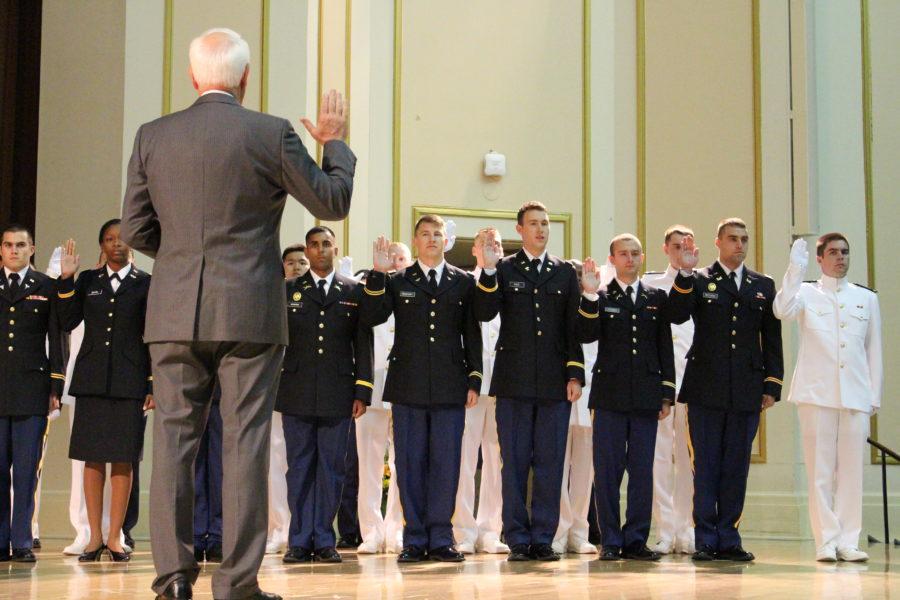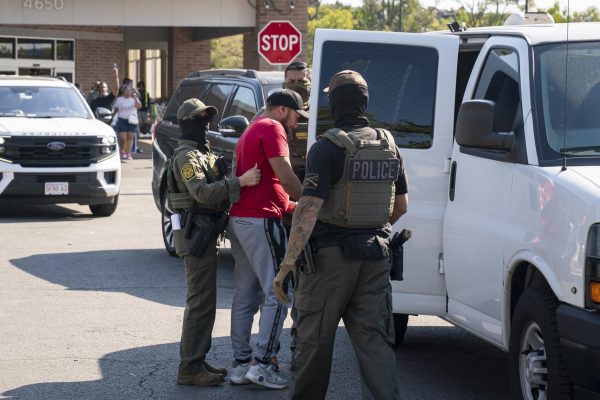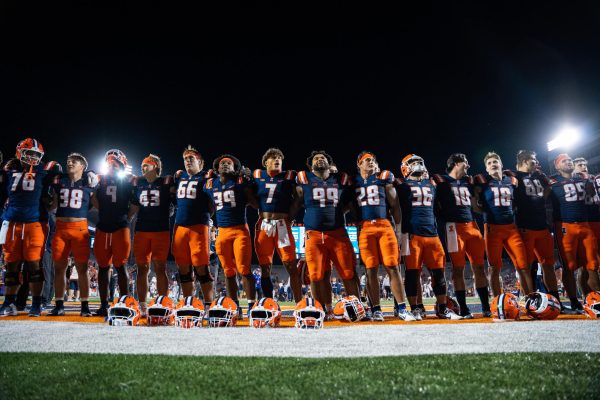University hosts ROTC commissioning ceremony
May 25, 2015
Last updated on June 14, 2016 at 08:34 a.m.
Kaushik Kancharla, a 21-year-old in Business, was among the young men and women commissioned as an officer of the United States military.
“For me, commissioning marked the start of my adult life, in that the rest of my life from this point forward will be dedicated to service towards my men, my country and the world as a whole,” Kancharla said. “Being commissioned was like the gateway into making a positive impact on the world.”
Robert Easter, former president of the University and the ceremony’s guest speaker, congratulated the young men and women. He spoke from his own experience in the military.
Get The Daily Illini in your inbox!
“From a personal perspective, as I moved to increasing levels of responsibility within the University, I found myself increasingly drawing on leadership skills that I first learned in the military,” Easter said. “Congratulations on your graduation from the University of Illinois. Thank you for taking the commission as an officer in the U.S. military, and may God bless America.”
Samuel Chubb, a 23-year-old in LAS, was also commissioned. Chubb said the ROTC program was the ultimate leadership experience; however, he said the ROTC program doesn’t receive the recognition it deserves.
“In general, I think we are the face of the University,” Chubb said. “Honestly, people don’t see it often, but when you dig deeper, this is what the University is founded on, so we kind of represent the history of the University. We represent the people that came before us.”
Although the ROTC Commissioning Ceremony is an annual event, Lt. Col. Eric Stetson said this one was special because it was his last.
After serving the country for a total of 28 years, three of which were specifically as a military professor in the University’s Army ROTC Program, Stetson is retiring.
Stetson, 46, is responsible for the entire curriculum. He makes sure the cadets receive the right program of instruction, so they can ultimately be commissioned as officers of the U.S. Army. He is also responsible for the welfare of the cadre and civilians who work in the ROTC detachment.
Lt. Col. Seth Hible has worked with Stetson for two years and said he admires Stetson’s personality.
“He’s tireless. He’s very detail-oriented, but to the point where he is also a leader who expects you to take your own initiative,” Hible said. “He treats you like a professional. Even the cadets are treated – especially their senior year – as second lieutenants, and they run the whole program based upon his guidance.”
Stetson started his own military career in the Army ROTC Program at Lafayette College, a small college on the East Coast.
He said he joined the army because he “wanted the adventure.”
“I wanted to be on a great team,” Stetson said. “I liked working with other people, and I wanted the challenges. The reason I stayed in the army is because I enjoyed working with other people, helping other people. Serving others, basically.”
Stetson said he remembers his commissioning ceremony very well.
“The Commandant of the Marine Corps was there for our commissioning. I don’t know how that happened. Four-star marine general. … General Gray. He shook our hands and punched each one of us in the arm, and I almost fell off the stage,” Stetson said.
Seven days after being commissioned, he went right into active duty. After training and working for many years in the U.S., he went on to being stationed in Germany for over four years.
From there, he was deployed to Bosnia, Kosovo, Qatar and Iraq.
“When you are deployed for the first time, your senses are all on high alert and you wonder if you learned all the things you need to learn and if you know how to do all the things you need to do to do your mission.”
However, Stetson believes the ROTC Program at the University prepares the cadets extremely well for deployment.
“The way we train our officers here, our officer candidates and cadets, they’re being equipped with the tools and the methods in problem-solving so that no matter what the situation they face when they deploy, they can work through the problems and figure out solutions,” Stetson said.
After years of moving from country to country, Stetson came to the University. He said he chose this job because he “realized it would be a fantastic opportunity to give back to the army and help develop young leaders. (I) knew it would stabilize (my) family for three years, and they wouldn’t have to worry about (my) deploying.”
Stetson first met his wife in Germany, where she worked at a child development center. They now have an 11-year-old daughter.
Although this year’s commissioning ceremony marks his retirement from the army, Stetson said he “wouldn’t trade it for anything.”
“I am just incredibly blessed for my experience in the military,” Stetson said. “All the friends I’ve made, all the lessons I’ve learned and for the ability to do the job to serve my country.”






